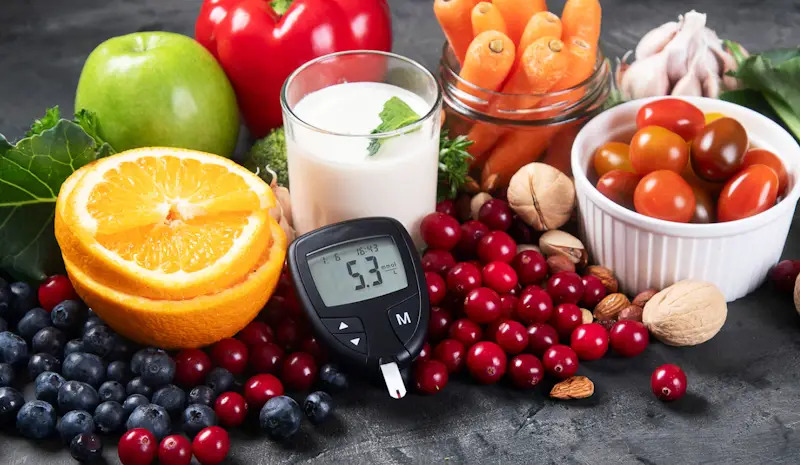Sugar is not always sweet. Consider a case of excess sugar entering your bloodstream, also known as ‘high blood sugar level’ or “hyperglycemia”. Hyperglycemia is one of the states leading to Diabetes. Diabetes mellitus is a chronic disorder caused by hereditary or non-standard eating habits and sedentary lifestyle leading to volatility in blood sugar levels. There are different types of diabetes; no two people with diabetes have similar complications. Hence, a ‘one-size-fits-all’ diabetes diet is unthinkable for people suffering from diabetes.
In feng shui, there are three gods i.e. Fuk, Luk, and Sau. ‘Sau’ is the God to attract health, and long-life into a person’s life. Hence, we can invoke Sau in us with a smart way of living through a healthy and balanced diet. Further, this type of diet helps manage blood glucose (sugar), control blood pressure and regulate cholesterol levels. Further, self-disciplined diet regime as prescribed by a doctor/ nutritionist lowers body weight and reduces the risk of diabetes complications i.e. heart problems and strokes, organ degenerative health conditions including certain types of cancers.
Three meals and three snacks per day
You daily food intake should be spread across 3 major meals (i.e. breakfast, lunch and dinner) and 3 healthy snacks in-between meals to resist hunger pangs. The quantity of snacks should not be equal to any of the 3 meals rather it should be fewer portions. A bed time snack helps a diabetic patient to overcome mid-night or early morning hypoglycemia.
Consume more of complex carbohydrates
Complex CHO (carbohydrates) is significantly better than simple CHO. As simple CHO (i.e. sugar, honey, jaggery, sweets, chocolates, muffins, fruit juice, carbonated beverages, plain rice, maida, sabudana or tapioca etc) does not contain any fiber so absorption is fast leading to a spike in blood sugar level. In comparison, foods with complex CHO are fiber-rich (i.e. Wheat, fruits with skin and pulp, rice with vegetables, salads, any kind of vegetables, wheat bread, wheat noodles, wheat pasta, etc.) thereby digestion and absorption period are longer than usual.
Reduce added sugar
We love sugar in our foods. Hence, it is hard at the beginning to cut down sugar and sugar variants. Therefore, practical substitutes of sugar are a good starting point. For example low-sugar or ‘0’ sugar labeled drinks, zero-calorie energy drink, coconut water, plain milk, buttermilk, different types of flavored tea and coffee without refined/natural sugar added and cut fruits with skin are healthy substitutes for sugar.
Moreover, consumption of low or zero-calorie sweeteners (i.e. artificial sweeteners) moderates our blood glucose levels and body weight. Most of the sweeteners available in the stores may harm more than do good to our body. Comparatively, stevia leaves as a sweetener is safer to switch to. In case of diabetes treatment, there are few conditions of ‘hypoglycemia’ (hypo) where sugary drinks can be used in moderation for treatment. For this special case, it is important not to cut down sugar intake as part of your diabetes management. However, if there is a prolonged hypoglycemia (i.e. low blood sugar level), consult with your doctor and diabetes management team on the diet plan.
Eat good quality and quantity of protein
Indian diet lacks in both quality and quantity of protein. It is advised to have sizable portion of 1st class of protein e.g. egg, fish, chicken, lean meat, etc in your diet if you are non-vegetarian. However, a vegetarian plate must have protein from plant and dairy sources such as broccoli, home-made paneer, low fat cheese, different pulses and legumes, soybeans, mushrooms, tofu etc.
Healthier fat eases your blood flow
Fat generates energy in our body. Vitamins and minerals are absorbed in our body with the help of fat molecules to provide us with energy and immunity strength. Are you aware that there are different types of fats positively or negatively impact our health?Daily cooking oil (e.g. rice bran oil, sunflower oil, sesame oil, canola oil, soya oil, corn oil, olive oil), unsalted nuts, seeds, avocados, oily fish are sources of healthy fats providing for good cholesterol in our body. In contrast, saturated fats increase the amount of bad cholesterol in blood thereby causing heart ailments and arterial blockage. Found primarily in animal products and processed foods like red and processed meat, ghee, butter, ‘vanaspati’, mayonnaise, biscuits, cakes, pies and pastries. A life-long fit-tip would be cut down on using oils in general for cooking, instead try to grill steam or bake foods.
Fulfill your daily dairy consumption
Dairy and milk products i.e. curd, butter milk, cheese or home-made paneer are sufficient to fulfill daily dietary calcium intake for your body. For a diabetic patient, average daily dairy product consumption should be ~500 ml.
Fiber creates magic with your blood sugar
Fiber has a key role in diabetic diet management to suppress blood sugar levels. For a diabetic person an average daily dietary fiber requirement is ~25-35 gm from normal consumed food (excluding any supplements). The best sources of dietary fiber are raw and cooked vegetables, whole fruits with pulp and whole grains and legumes. Thus, vegetable or lightly cooked leafy vegetables across 3 major meals with whole fruits for snacks can provide adequate amount of fiber in your diet.
Light and tasty snacks is a smart choice
Snacks should be tasty at the same time healthy. For example low fat yogurts, unsalted nuts (almonds and walnuts), flax / pumpkin seeds, fruits and vegetables, sprouts salads, makhana (lotus seeds) instead of fried crisps, potato or banana chips, biscuits and chocolates. Portions size is sacrosanct and needs our self-control. Hence, snacks portion should be minuscule as compared to your basic meals.
Consume alcohol responsibly
Alcohol has a high calorific value, so drinking in moderation is recommended to lose body weight. Hence, restrict your alcohol consumption to a maximum of 1 ounce per week. Guard your urge to binge drinking; and practice surviving for several days a week without consuming alcohol. If you are administered with insulin dose and or periodic diabetes medications, avoid alcohol on an empty stomach as it may lead to a serious condition of hypoglycemia. Instead, during dinner or after dinner is a suitable time to consume alcohol, though always in moderation
Body is water, so keep yourself hydrated
Generally, water is never considered as a nutrient in our diet. Do you know that up to 60% of the human adult body is water? Our body uses water to nourish all its cells, organs, and tissues. Water is depleted from our body through various actions including involuntary functions like breathing, sweating, and digestion. Drinking water can be practiced throughout the daylight hours however; water should be consumed before major meals. Further, there should be time interval after meal to resume drinking water. Hence, it is pertinent to re-hydrate ourselves by drinking enough water, non-sugar fluids and eating foods that contain natural water or freshly squeezed juices along with pulp (instead of packaged or processed juices) as it help lower our body temperature and systematically maintain other body functions.





